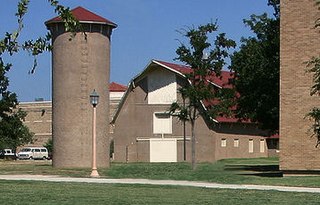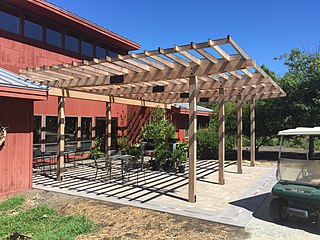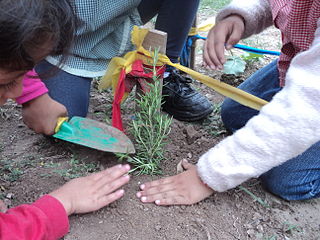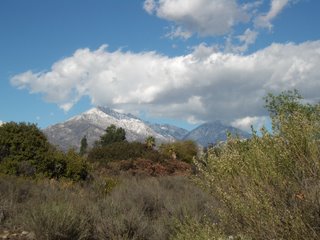
Outdoor education is organized learning that takes place in the outdoors, typically during school camping trips. Outdoor education programs sometimes involve residential or journey wilderness-based experiences in which students participate in a variety of adventurous challenges and outdoor activities such as hiking, climbing, canoeing, ropes courses and group games. Outdoor education draws upon the philosophy, theory, and practices of experiential education and environmental education.

Environmental education (EE) refers to organized efforts to teach how natural environments function, and particularly, how human beings can manage behavior and ecosystems to live sustainably. It is a multi-disciplinary field integrating disciplines such as biology, chemistry, physics, ecology, earth science, atmospheric science, mathematics, and geography.

Agricultural education is the teaching of agriculture, natural resources, and land management. At higher levels, agricultural education is primarily undertaken to prepare students for employment in the agricultural sector. Classes taught in an agricultural education curriculum may include horticulture, land management, turf grass management, agricultural science, small animal care, machine and shop classes, health and nutrition, livestock management, and biology.
The Sigurd Olson Environmental Institute is an outreach arm of Northland College in Ashland, Wisconsin. A 1971 environmental conference at Northland with Sigurd Olson as a speaker was the origin of the institute. Robert Matteson was the founder of the Institute. The Institute opened in Spring, 1972.

The Idaho Botanical Garden, located in the historic Old Penitentiary District of Boise, Idaho, is a 501(c)(3) nonprofit organization dedicated to connecting people, plants, and nature. The Garden serves as a gathering space in the Boise community and advocates environmental stewardship. Spanning 15 acres, the Idaho Botanical Garden is a premier collection of plants cultivated for the unique sagebrush steppe ecosystem of the Treasure Valley aimed at showcasing the region's biodiversity.

Northland College is a private college in Ashland, Wisconsin. Founded as the North Wisconsin Academy in 1892, the college was established in 1906. Originally affiliated with the Congregational Church, the college remains loosely tied to the Congregational Church's descendant, the United Church of Christ. It enrolls 526 full-time undergraduates and employs 60 faculty members and 99 staff members. Northland College is accredited by the Higher Learning Commission.

The California Native Plant Society (CNPS) is a California environmental non-profit organization that seeks to increase understanding of California's native flora and to preserve it for future generations. The mission of CNPS is to conserve California native plants and their natural habitats, and increase understanding, appreciation, and horticultural use of native plants throughout the entire state and California Floristic Province.

Aurora University (AU) is a private university in Aurora, Illinois, United States. In addition to its main campus, AU offers programs online at its George Williams College campus in Williams Bay, Wisconsin as well as its Woodstock Center in downtown Woodstock, Illinois. Approximately 6,200 students are enrolled in bachelor's, master's, and doctoral degree programs at Aurora University.

Natural landscaping, also called native gardening, is the use of native plants including trees, shrubs, groundcover, and grasses which are local to the geographic area of the garden.

The Catalina Island Conservancy is a nonprofit organization established to protect and restore Santa Catalina Island, California, United States. The Conservancy was established in 1972 through the efforts of the Wrigley and Offield families. The Conservancy was created when both families deeded 42,135 acres (170.51 km2) of the island over to the organization—88% of the Island.

Adkins Arboretum is a 400-acre native garden and arboretum located within Tuckahoe State Park at 12610 Eveland Road, Ridgely, Maryland. The grounds contain five miles of paths through meadows and native plant gardens on the Eastern Shore of Maryland. Its gardens contain a "living collection" of more than 600 species of native shrubs, trees, wildflowers and grasses, used to promote land stewardship practices in the Chesapeake Bay region.
Robin Wall Kimmerer is a Native American botanist, author, an American Distinguished Teaching Professor of Environmental and Forest Biology; and the director of the Center for Native Peoples and the Environment at the State University of New York College of Environmental Science and Forestry (SUNY-ESF).

The Native Plant Society of Texas is a Texas not-for-profit conservation organization that promotes the "conservation, research and utilization of the native plants and plant habitats of Texas through education, outreach and example".

Garden-based learning (GBL) encompasses programs, activities and projects in which the garden is the foundation for integrated learning, in and across disciplines, through active, engaging, real-world experiences that have personal meaning for children, youth, adults and communities in an informal outside learning setting. Garden-based learning is an instructional strategy that utilizes the garden as a teaching tool.

Norman Irving Wengert was an American political scientist who wrote about the politics of natural resources, advanced a seminal theory of the "politics of getting", and had a number of significant roles in his public and academic career. He was born in Milwaukee, Wisconsin to Eugene F. and Lydia Semmann Wengert. He pioneered the revival of the study of political economy in the United States with publication of Natural Resources and the Political Struggle, and later authored more than fifty monographs and studies on the political economy and public administration of environmental resources. His scholarship explored the politics of natural resources and environmental policy formation and administration, with emphases in national energy policy, urban water planning and management, land use planning and controls, national forest management, and citizen participation in administrative processes.

Grand Canyon Conservancy, formerly known as Grand Canyon Association, is the National Park Service's official non-profit partner of Grand Canyon National Park, raising private funds, operating retail shops within the park, and providing premier guided educational programs about the natural and cultural history of the region. Supporters fund projects including trails and historic building preservation, educational programs for the public, and the protection of wildlife and their natural habitat.

The 85 acre Robert J. Bernard Biological Field Station (BFS) is located on the north side of Foothill Boulevard between College Avenue and Mills Avenue in Claremont, California. The BFS provides facilities and ecological communities for high-quality teaching and research in biological, environmental, and other sciences to the students, faculty, and staff of the Claremont Colleges. It may also be used by members of other academic institutions and by public groups for educational purposes. The BFS is a member of the Organization of Biological Field Stations (OBFS). It was named after Claremont Colleges president Robert J. Bernard.
Project Learning Tree (PLT) is an environmental education program for teaching children about trees and forests using hands-on activities. It was created in 1976, after passage of the first National Environmental Education Act in 1970 and celebration of the first Earth Day in 1970, raised the profile of environmental education in the United States.
Lorrie Otto was an American speaker and author. As an environmentalist, she was an ardent supporter of the protection of biological diversity. She helped to bring about the DDT ban in the United States and helped to establish the Environmental Defense Fund.















